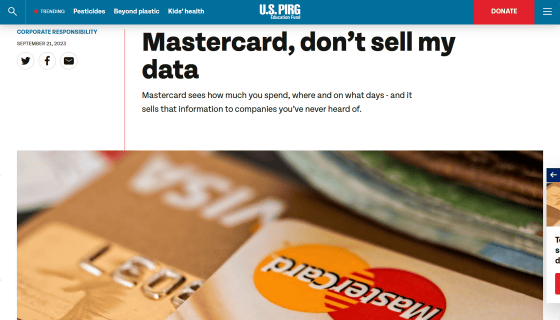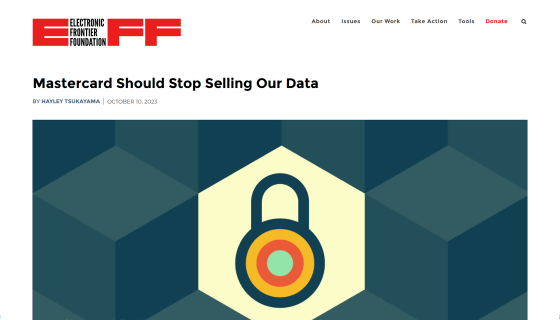Electronic Frontier Foundation agrees with the claim that ``Mastercard should stop selling data collected from credit card users''

Mastercard, don't sell my data
https://pirg.org/edfund/articles/mastercard-dont-sell-my-data/

How Mastercard sells its 'gold mine' of transaction data
https://pirg.org/edfund/resources/how-mastercard-sells-data/
Consumer group says Mastercard is selling cardholders' data without their knowledge - CBS News
https://www.cbsnews.com/news/mastercard-credit-card-customer-data-sold/
'Many of the companies we interact with on a daily basis today are finding new sources of revenue by selling their customers' data,' PIRG said in a report released in September 2023, adding that international payments companies It has been pointed out that Mastercard is selling the user data it collects.
Mastercard, which processes millions of credit card payments around the world every day, collects data on when, where, what, and how much cardholders buy. Of course, this data is also needed to perform the primary functions of credit cards, such as accurately executing transactions and preventing fraudulent use. However, Mastercard sells this data to data brokers, advertisers, and other third parties to make profits, regardless of credit card functionality.

According to the PIRG report, Mastercard sells a database of more than 125 billion transactions through its internal
A page on AWS Data Exchange , a data set sales platform, shows that Mastercard's data sets are aggregated and anonymized consumer spending patterns that, when purchased, are used to identify users based on data such as transaction frequency, location, and time of day. It is said that it can be classified. Aggregated and anonymized sales data reduces the risk of third parties gaining access to customer personal information, but does not prevent third parties from serving ads based on their data.
The dataset sold by Mastercard can extract user categories by region, such as ``people who frequently purchase fast fashion,'' ``people who often purchase expensive tickets online,'' and ``people who shop in physical stores.'' PIRG reports that it is also possible to predict spending behavior over the next three months based on the assigned score.

In this way, it is not only Mastercard that sells collected user data to third parties, but other credit card companies, smartphone manufacturers, communication carriers, automobile manufacturers, etc. are also engaged in data sales. However, Mastercard's monetization strategy, which has established itself as a global payments company, is a good example of learning about the excessive data economy.
PIRG states that the sale of user data by large companies such as Mastercard can cause harm to consumers, including:
◆1: Security and fraud
PIRG points out that the more companies engage in data collection and sales, the more their users' data is at risk of being compromised or hacked. Mastercard aggregates and anonymizes the data it sells, but when data is leaked from companies that don't take these measures, it can be used by fraudsters to identify vulnerable elderly and dementia patients. There is a possibility.
◆2: Annoying and invasive targeted advertisements
In the 1970s, the average American saw between 500 and 1,600 ads a day, but in today's world, where we're flooded with ads on websites and social media in addition to traditional ads, the average American sees an estimated 5,000 ads a day. It seems that advertisements are being displayed. While the number of advertisements has already increased, if targeted advertisements using user data collected by companies increase, the possibility that consumers will spend money on things they don't need will increase.
◆3: Identification of individuals from aggregated and anonymized data
We also know that the aggregation and anonymization methods that companies use to protect privacy are actually not that effective.

PIRG says, 'Company data collection and sales have gone too far. Data collection and sales are largely unregulated, and virtually all major companies have begun to monetize customer data in ways people don't expect.' '' and called on Mastercard to stop selling user data.
On October 10th, the Electronic Frontier Foundation announced its support for PIRG's campaign. In a statement, the Electronic Frontier Foundation joins a campaign led by PIRG to call on Mastercard to limit data collection and stop selling cardholder information. It's just one company profiting from the sale of personal data. As a consumer advocate, we're calling on the company to honor the trust cardholders place in it by committing to stop selling data. ”
Mastercard Should Stop Selling Our Data | Electronic Frontier Foundation
https://www.eff.org/deeplinks/2023/10/mastercard-should-stop-selling-our-data

Related Posts:
in Note, Posted by log1h_ik






